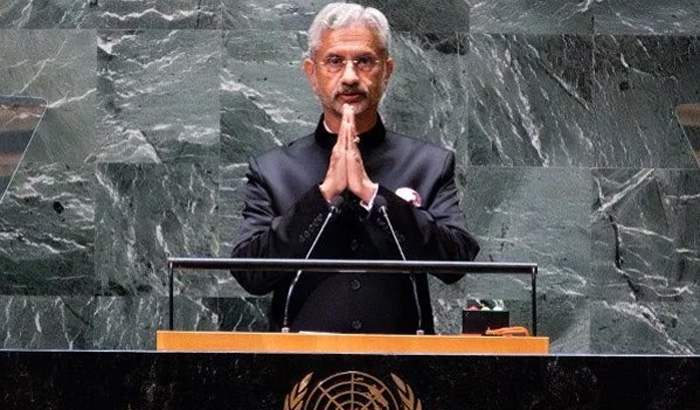Part of Manipur problem due to migrants: S Jaishankar
A part of the troubles in Manipur is due to the migrants (from Myanmar), there is an “ideological agenda, biases, factual distortions” behind criticism of India’s human rights record, and India will pursue its own path of health, economic, climate, and development and security policy, external affairs minister S Jaishankar has said.
During a conversation at the Council of Foreign Relations in New York, when a representative of Human Rights Watch asked him about Myanmar and what the government is doing, Jaishankar said, “One part of the problem in Manipur has been the destabilising impact of migrants who have come. That’s one aspect of it. There are tensions which obviously have a long history that precede that. Today, the effort is on part of the state and Union government is to find a way so that normalcy returns, that arms which were seized are recovered, and that there is adequate law and order enforcement so that incidents of violence don’t happen.”
Asked, separately, about India’s slipping ranks on various global indices on democracy and freedom and whether he was concerned it would affect India’s rising power in the world, referring to an earlier answer by the minister, Jaishankar said those writing these reports had “strong biases”, they distorted facts, they were riddled with bias, and there was an “ideological agenda”.
But more broadly, when asked about broader Indian positions and what India can do on global issues, he pointed to the path of independent foreign policymaking.
On climate, he said, the bottom line was there was a “visible paucity of resources and terms on which resources available, both access to finance and terms of access to finance”. He pointed out that among the themes of the G20 summit was the Green Development Pact, but this at a time when sustainability was under threat due to the “tremendous toll” that Covid-19 had taken on developing countries to pursue SDG (sustainable development goals) pathways.
On green development, he said that with each passing year, tech options were growing. “Lots of things are viable today. In the past, we often had a problem where we didn’t have a solution. Today, we have a solution. The issue is to scale it up, make it affordable. And if it is affordable, then it is accessible.” The reform of international financial institutions, green development pact, sustainable development goals won’t get fixed without a solution on other, he added.
Referring to these as the larger themes of Indian G20 presidency, he said, “There is a possibility that there could be some progress on some of these issues.”
He added when discussing the diversity of supply chains, given how often big climate events were occurring, the globally disruptive effects of those events, and the over-centralisation of production (in China), during risk assessments, it was also key to bring climate in. He added that with regard to international financial institutions, it was important to leverage resources one had besides issues of recapitalisation.
Jaishankar was asked a question about the 25th anniversary of the Pokharan tests, linked with India’s independent choices on technology and whether India could chart its own pathway especially on tech and geopolitical power.
The minister said that the question fit into the multipolar picture that they discussed, and if he was to reflect on the last decade, particularly the last few years, there was “no lack of advice” but India had to think through solutions for itself. He said that it was important to take experiences and lessons from others, but a country of the scale and complexity of India had to assess its situation, dig into experiences and DNA, and come up with the right answers.
Then, offering examples of different and independent pathways, he said, he spoke of how when Covid hit India, it didn’t have much health infrastructure to deal with it. But, the minister said, India pushed for manufacturing and inventing vaccines, it used a digital backbone for a mass scale vaccination campaign, and with it, India found a unique way with much higher percentage and speed of vaccination across complex geographies than others.
On the economy, Jaishankar pointed out that there was worry about what to do with the economy. “Some countries went in for pump priming, there were countries who actually thought supporting businesses was one way of mitigating the situation. Probably in their situation, it made sense. We had to look at basics. How do you deal with a large segment of population where a lockdown meant a loss of livelihood, and they didn’t have access to food and finances.”
He then said that if he looked back, India was able to create a social welfare system, effectively giving the equivalent of food stamps to 800 million people, put money directly in the accounts of 450 million people, housing to 150 million. “A lot of it is through the embrace of tech answers,” he said, adding that India was even deploying its own 5G stack when the world thought it only had China and Europe to choose from.
“Whether it is development or security or policy choices maybe on climate action or food security or energy, it is important for a country like India to think through for itself.”
Other experiences mattered, Jaishankar said, adding that India was active and open to best practices around and one learnt something from someone every day. “But we have to think through for ourselves. That is one of the differences in India today.”
The minister then clarified that this idea of a self reliant India did not mean economic protectionism, for India was actively seeking foreign investment, technology, and introduced incentive schemes to collaborate in sectors such as semiconductors. “What we want is for them to collaborate with us, but on our terms and on our strategic kind of pathway rather than make us a part of their strategy,”. Jaishankar said.

